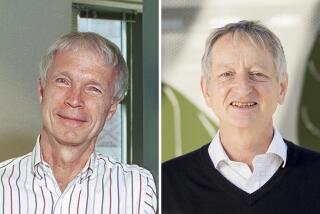Herbert A. Simon; Nobel Prize Winner, Pioneer in Artificial Intelligence
Herbert A. Simon, who won the 1978 Nobel Prize in economics for pioneering work on the nature of decision making, has died.
Simon, a longtime faculty member at Carnegie Mellon University and a leader in the field of artificial intelligence, died Friday at Presbyterian University Hospital in Pittsburgh of complications from surgery last month. He was 84.
In his Nobel-winning research, conducted in the 1940s and â50s, Simon discovered that rules of formal logic do not generally apply to human decision making.
As outlined in such books as âAdministrative Behavior and Organizations,â Simon said business executives, confronted with myriad choices and having a limited amount of accurate information on which to base decisions, most often reject risky, yet potentially more profitable, solutions. They opt instead for a safer alternative that will produce acceptable, if not spectacular, results. He called this theory âbounded rationality.â
In an interview some years after receiving the Nobel Prize, Simon said his interest in decision making was piqued during his undergraduate days at the University of Chicago when he made a field study of the recreation department in Milwaukee, his hometown. That study, he said, developed into work on âtrying to make more realistic the classical economic theory which had assumed that businessmen were kind of omniscient and lived in the world of certainty.
âI tried to develop some theories that took account of the uncertainty in the world and the complexity in the world,â he said.
Simon entered the University of Chicago in 1933 with the notion of becoming a social scientist who applied the same rigorous methodology to his discipline that was used in the hard sciences.
He earned a bachelorâs degree in political science in 1936. Seven years later he received his PhD in political science, also from the University of Chicago.
Simon held research and faculty positions at UC Berkeley and the Illinois Institute of Technology before beginning, in 1949, a long relationship with Carnegie Mellon, where he was the Richard King Mellon professor of computer science and psychology.
In the mid-1950s, Simonâs work took a sharp turn. In studying the basis of administrative decisions, he and a colleague, Allen Newell of Rand Corp., decided that the best way to study problem solving was to simulate it with computer programs.
Trying to Simulate Human Thought
After asking people to explain the reasoning processes they went through to solve problems, Simon and Newell converted the answers into programs that they believed gave computers the ability to simulate human thought.
Their breakthrough came in December 1955, a day Simon later told a reporter was the most exciting of his life.
âWe were working on a logic theorist program, and we finally got it running,â Simon told Jeffrey Zaslow in an interview for Pittsburgher magazine. âIt was then that we knew we had a program that could solve problems in a humanoid manner.â
That successful experiment was one of the first examples of what would come to be known as âartificial intelligence.â It was a field Simon would remain interested in the rest of his life.
Some of the models he worked on involved complex cognitive tasks, such as the processes of scientific discovery and the use of visual imagery in thinking.
âMy research career has been devoted to understanding human decision-making and problem-solving processes,â he said some years ago. âThe pursuit of this goal has led me into the fields of political science, economics, cognitive psychology, computer science and philosophy of science, among others.â
In addition to his Nobel Prize, Simon was awarded the National Medal of Science in 1986. In 1993, he was given the American Psychological Assn.âs award for outstanding lifetime contributions to psychology. The next year, he was one of just 14 foreign scientists to be inducted into the Chinese Academy of Sciences.
He is survived by his wife, Dorothea, and three children.






